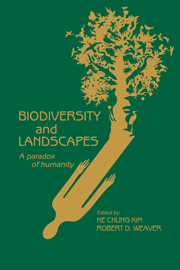Book contents
- Frontmatter
- Contents
- Contributors
- Preface
- Part I Introduction
- Part II Human values and biodiversity
- Part III Human processes and biodiversity
- 5 Preindustrial man and environmental degradation
- 6 Conserving biological diversity in the face of climate change
- 7 We do not want to become extinct: the question of human survival
- 8 Germplasm conservation and agriculture
- Part IV Management of biodiversity and landscapes
- Part V Socioeconomics of biodiversity
- Part VI Strategies for biodiversity conservation
- Part VII Biodiversity and landscapes: postscript
- Index
7 - We do not want to become extinct: the question of human survival
Published online by Cambridge University Press: 04 August 2010
- Frontmatter
- Contents
- Contributors
- Preface
- Part I Introduction
- Part II Human values and biodiversity
- Part III Human processes and biodiversity
- 5 Preindustrial man and environmental degradation
- 6 Conserving biological diversity in the face of climate change
- 7 We do not want to become extinct: the question of human survival
- 8 Germplasm conservation and agriculture
- Part IV Management of biodiversity and landscapes
- Part V Socioeconomics of biodiversity
- Part VI Strategies for biodiversity conservation
- Part VII Biodiversity and landscapes: postscript
- Index
Summary
Introduction
The situation facing humankind involves the collapse of any balance between our species and the rest of life on the planet. Paradoxically, at the time when we stand at the threshold of degeneration of the ecosystem and degradation of human quality of life, knowledge, science and technology are now in a position to provide both the human creativity and the technology needed to take remedial action and rediscover harmony between nature and humankind. Only the social and political will is lacking.
(UNESCO, 1989)Among all the talk of a mass extinction of species underway, there is occasional mention of the thought that humankind itself could eventually become endangered if not extinct as a result of its reckless depletion of its habitats and life-support systems. While this prospect is extremely unlikely (though not impossible), there is every chance that if we continue to deplete the carrying capacity of our planet, civilized society as we know it will become destabilized and impoverished to a degree undreamed of by today's political leaders.
What would be the principal factors involved? What would be the main mechanisms at work? How far have the depletive processes advanced already? How readily can they be slowed and halted, even reversed? How far is the general public and its political leaders aware of the overall threat? These are some of the questions to be addressed in this chapter.
- Type
- Chapter
- Information
- Biodiversity and LandscapesA Paradox of Humanity, pp. 133 - 150Publisher: Cambridge University PressPrint publication year: 1994



